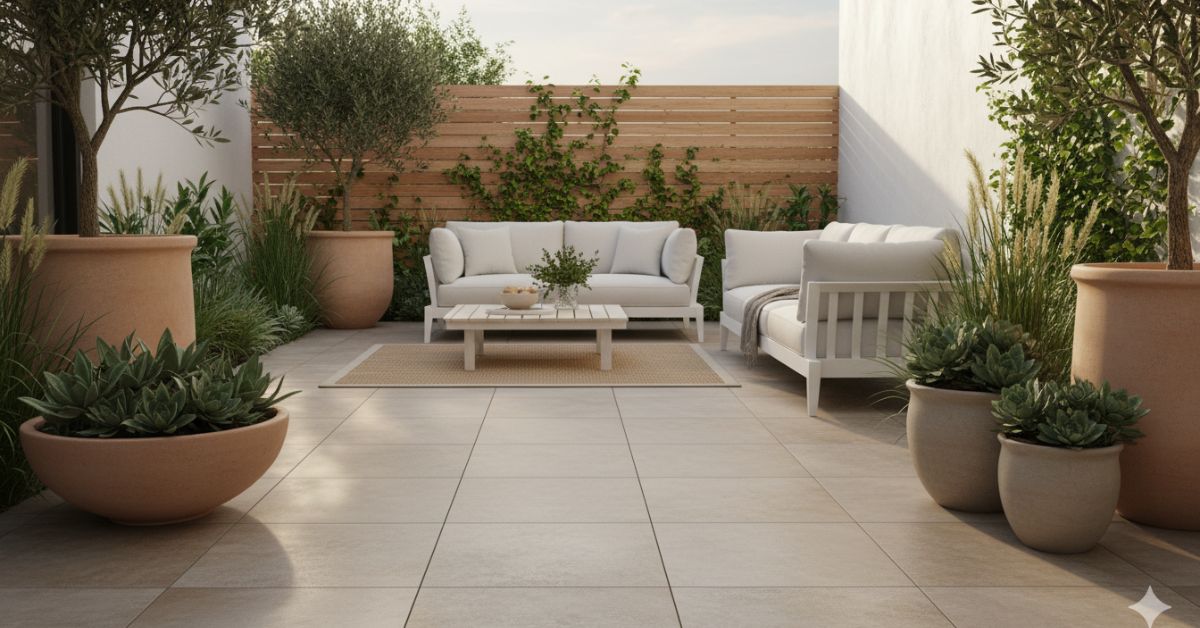Porcelain garden tiles are crafted to handle outdoor conditions while keeping a modern and polished look. Made from refined clay fired at very high temperatures, they are dense, strong, and resistant to water, frost, and stains. Their non-porous surface also prevents mould and fading, making them ideal for gardens exposed to changing weather.
These tiles are now widely used for patios, pathways, and terraces because they last long and need very little care. With many colours and textures available, porcelain garden tiles suit both contemporary and traditional outdoor designs.
How Porcelain Garden Tiles Are Made
How porcelain garden tiles are made starts with a mix of refined clay, sand, and natural minerals such as feldspar and kaolin. These ingredients are blended with water, forming a fine mixture that is dried into a powder and pressed into tile moulds. This creates the base structure needed for outdoor durability.
Designs and textures are added using digital inkjet printing, which allows realistic stone, wood, or marble effects. The tiles are then fired in a kiln at temperatures above 1200°C. This step, known as vitrification, gives porcelain garden tiles their dense, non-porous surface- making them resistant to water, frost, and stains. The finished product is a strong, low-maintenance tile built to last in outdoor environments.
Types of Porcelain Tiles for Gardens
types of porcelain tiles for gardens vary by style, finish, and thickness, offering flexibility for both modern and traditional outdoor spaces. Each type serves a specific purpose- some focus on appearance, others on durability and texture. Porcelain garden tiles are designed to handle changing weather while keeping a consistent look across patios, paths, and terraces.
-
Stone-effect tiles: Mimic natural stones like slate or limestone for a rustic charm.
-
Wood-effect tiles: Provide the warmth of timber without the upkeep.
-
Concrete-effect tiles: Create a modern, minimalist feel for urban spaces.
-
Patterned tiles: Add personality and decorative detail to patios.
-
Textured finishes: Improve grip and safety in wet conditions.
-
20mm thick tiles: Commonly used for driveways and heavy-traffic areas due to their strength.
Perfect Size for Garden Porcelain Tiles
The perfect size for garden porcelain tiles depends on space, layout, and design preference. Larger tiles create a sleek, open feel, while smaller ones add character and pattern. Standard outdoor porcelain is 20mm thick, built for strength and weather resistance.
-
Small gardens: 600×600mm tiles reduce grout lines and make spaces appear bigger.
-
Large patios: 900×900mm or 1200×600mm slabs give a seamless, modern look.
-
Paths and accents: Smaller cobble-style tiles work best for decorative or curved areas.
How Important Are Porcelain Tiles for the Garden
How important porcelain tiles are for the garden depends on their role in combining durability, safety, and design flexibility. These tiles are built to handle weather extremes without cracking or fading, making them a long-term choice for outdoor areas. Their dense, low-porosity surface resists water, stains, and frost, keeping patios and paths clean with little upkeep. Porcelain’s wide range of styles also allows it to blend with both modern and traditional garden designs.
Many of the same features make porcelain outdoor tiles a preferred choice for patios, pool surrounds, and terraces.
Key Benefits:
-
Strong and hard-wearing against heavy use
-
Slip-resistant for safety in wet areas
-
Low maintenance, no sealing needed
-
Resistant to frost, stains, and fading
Things to Consider:
-
Professional installation may be required for large areas
-
Higher upfront cost but lower maintenance over time
How Is Porcelain Tile Different from Other Types of Garden Tiles
How porcelain tile different from other types of garden tiles lies mainly in its strength, density, and resistance to weather damage. Porcelain is fired at over 1,200°C, making it far denser and less porous than stone or concrete. This gives it exceptional durability against frost, stains, and moisture, while requiring almost no sealing or upkeep. Other materials, like sandstone or concrete, may crack or fade over time under similar conditions.
|
Feature |
Porcelain Tiles |
Natural Stone / Concrete Tiles |
|
Durability |
Extremely strong, scratch and chip-resistant |
Can chip or wear over time |
|
Porosity |
Less than 0.5%, non-porous |
Highly porous, absorbs water |
|
Maintenance |
No sealing, easy to clean |
Needs regular sealing |
|
Weather Resistance |
Frost and UV proof |
Can crack or fade |
|
Appearance |
Consistent, modern finishes |
Natural, varied look |
Common Mistakes People Make
Common mistakes people make when installing porcelain garden tiles often come down to poor planning or incorrect technique. One frequent issue is skipping surface preparation, leading to uneven tiles or cracks later. Another is using the wrong adhesive or trowel size, which affects how well the tiles bond to the base. Many also forget to order extra tiles for cuts and replacements, creating problems if batches differ in colour.
-
Poor surface preparation causes uneven finishes.
-
Using the wrong adhesive or trowel leads to weak bonding.
-
Failing to order 10–15% extra tiles causes supply issues.
-
Skipping spacers results in irregular gaps.
-
Ignoring slip ratings or finishes creates unsafe surfaces in wet conditions.
Care Tips to Keep Them New
Proper care keeps porcelain garden tiles looking clean and bright for years. Regular maintenance helps prevent stains, grime, and weather-related wear. Start by sweeping or rinsing the surface to remove dirt and debris that can cause scratches. Follow with gentle washing using warm water and a mild pH-neutral cleaner to preserve the tile’s finish. Always rinse thoroughly and dry the surface to avoid watermarks.
-
Sweep or rinse regularly to remove grit.
-
Wash with mild soap and warm water.
-
Rinse and dry after cleaning to prevent residue.
-
Avoid bleach, acids, or abrasive pads that can scratch.
-
Use mats in high-traffic areas to reduce wear.
-
Clean grout lines often and seal them for extra protection.
Final Thoughts
Porcelain garden tiles bring a balance of durability, low upkeep, and timeless design to any outdoor space. Their resistance to stains, frost, and fading makes them a smart long-term choice for patios, pathways, and terraces. With the right installation and simple maintenance routine, they retain their appearance for years, even under harsh weather.
For anyone planning a full home or outdoor renovation, explore our Complete Guide to Porcelain Tiles to understand how these tiles perform across floors, walls, and gardens, helping you choose the right style, finish, and format for your space.
FAQ
Do porcelain garden tiles get slippery when wet?
Most outdoor porcelain tiles have a textured, R11 slip-resistance rating, which makes them safe for wet areas such as gardens, pool surrounds, and driveways.
How thick should porcelain garden tiles be?
Outdoor porcelain tiles are usually 20mm thick, offering the right balance between strength and weight for outdoor paving and high-traffic areas.
Can porcelain garden tiles be laid on grass or gravel?
Yes, they can. When laid on a stable bed of gravel or grass using pedestal or dry-installation systems, porcelain tiles create durable walkways and stepping paths.
Are porcelain garden tiles better than natural stone?
Porcelain tiles are stronger, less porous, and require no sealing compared to natural stone. They resist frost, stains, and moss, keeping a clean look with minimal upkeep.
Can porcelain tiles fade in sunlight?
No. The colours and patterns are baked into the surface during manufacturing, making them UV-stable and fade-resistant even under direct sunlight.
What colour porcelain tiles are best for gardens?
Grey, beige, and natural stone-look porcelain tiles are popular choices for gardens, blending well with greenery while hiding dirt and outdoor wear.

